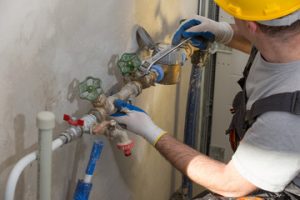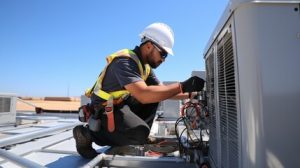Maintaining a reliable and efficient plumbing system is essential for ensuring a comfortable, functional, and safe home environment. From daily routines such as cooking, cleaning, and bathing to the long-term preservation of property value, plumbing systems play a central role in supporting household needs.
When issues arise, they often require immediate attention to prevent disruptions and costly damage. This is why expert Plumber Rosenberg TX is invaluable, offering long-lasting home plumbing solutions designed to enhance system performance, prevent recurring problems, and extend the lifespan of essential fixtures and piping. Understanding the benefits of professional plumbing services helps homeowners make informed decisions that contribute to a smoother and more efficient living experience.

One of the most significant advantages of working with expert plumbers is their ability to diagnose plumbing issues accurately and efficiently. Many problems, such as hidden leaks, slow drains, or fluctuating water pressure, may appear minor at first but often indicate deeper issues within the system. Professional plumbers use advanced diagnostic tools and techniques to identify the root cause of the problem rather than just treating surface-level symptoms. This thorough approach ensures that solutions are not only fast but also long-lasting, preventing future breakdowns and minimizing the risk of repeated repairs.
Leaks are among the most common plumbing issues encountered in homes, and they can quickly escalate if left untreated. Whether originating from pipes, faucets, fixtures, or appliances, leaks can lead to water damage, mold growth, and increased utility costs. Expert plumbers employ advanced leak detection methods to locate both visible and hidden leaks with precision. Once identified, they implement durable repair solutions, which may include pipe sealing, fixture replacement, or re-routing water lines. By addressing leaks promptly and effectively, homeowners can protect their homes from structural damage and ensure the efficient use of water resources.
Drainage issues also frequently affect households, with clogs forming in sinks, showers, toilets, and floor drains. Over time, hair, grease, soap residue, food particles, and other debris can accumulate within pipes, leading to slow draining or complete blockages. While DIY methods may temporarily improve drainage, they rarely address the deeper buildup within the plumbing system. Expert plumbers use professional-grade tools such as drain snakes, hydro-jetting machines, and video inspection equipment to remove clogs thoroughly and safely. These advanced methods not only restore proper drainage but also help prevent future blockages by clearing the pipes of residue and buildup that DIY solutions often miss.
Water heater issues can significantly impact a household’s comfort and convenience. Fluctuating temperatures, insufficient hot water, unusual noises, or leaks around the water heater are all signs that professional attention is needed. Expert plumbers are experienced in servicing both traditional tank-style water heaters and modern tankless models. They can diagnose issues quickly and recommend appropriate repairs, whether that involves replacing heating elements, flushing the tank, or installing new components. When a water heater has reached the end of its lifespan, professionals can guide homeowners through choosing an energy-efficient replacement that meets their household’s needs. Proper installation ensures optimal performance, improved energy savings, and long-term reliability.
Toilet issues are another common concern for homeowners, and they can be both inconvenient and costly if not addressed promptly. Constant running, weak flushing, frequent clogs, or leaks at the base of the toilet can indicate worn-out components or internal blockages. Expert plumbers can inspect the toilet’s internal mechanisms, replace faulty parts, and clear any obstructions within the drain line. In cases where the toilet is outdated or severely damaged, professionals may recommend upgrading to a more efficient model that uses less water without compromising performance. These long-lasting solutions ensure smooth operation and reduce the likelihood of recurring problems.
Faucets and fixtures also benefit from expert plumbing services, as they are essential components for controlling water flow throughout the home. Over time, minerals, corrosion, and regular wear can cause faucets to leak, make unusual noises, or function improperly. Expert plumbers can repair or replace damaged fixtures, ensuring smooth and efficient water flow. Modern fixture upgrades, such as low-flow faucets and touch-free designs, not only enhance convenience but also reduce water wastage. By installing durable, high-quality components, professional plumbers help homeowners achieve long-lasting improvements in both performance and aesthetics.
Pipe issues, such as corrosion, freezing, or physical damage, can compromise the entire plumbing system if not addressed properly. Expert plumbers are equipped to handle minor repairs as well as large-scale pipe replacements. They can identify deteriorating pipes, assess the extent of damage, and recommend cost-effective solutions. In some cases, trenchless repair methods may be used to restore pipe integrity without major excavation. These modern techniques minimize disruption while delivering durable and long-lasting results. Proper pipe maintenance and timely repairs help prevent leaks, improve water flow, and extend the lifespan of the entire plumbing network.
Preventive maintenance is another essential aspect of long-lasting home plumbing solutions. Expert plumbers encourage routine inspections and scheduled maintenance to detect issues early and maintain optimal system performance. During a maintenance visit, professionals may check for leaks, test water pressure, clean drains, inspect water heaters, evaluate fixture condition, and assess overall plumbing health. This proactive approach allows homeowners to address problems before they become emergencies, saving time, money, and stress. A well-maintained plumbing system is more efficient, more durable, and less likely to surprise homeowners with unexpected breakdowns.
Emergency plumbing services also contribute to long-lasting solutions, as quick action during a crisis can prevent extensive damage. Burst pipes, severe leaks, overflowing toilets, and other urgent problems require immediate attention from skilled plumbers. Expert professionals are trained to respond efficiently in emergencies, using their experience and tools to limit damage and restore functionality. Fast and effective emergency repair ensures that homeowners can quickly return to their normal routines while protecting their property from further harm.
Water quality is another factor that affects the longevity and performance of home plumbing systems. Hard water, which contains high levels of minerals, can lead to scale buildup inside pipes, water heaters, and fixtures. Over time, this buildup restricts water flow, reduces appliance lifespan, and affects the overall efficiency of the plumbing system. Expert plumbers can assess water quality and recommend filtration or softening systems that reduce mineral content and protect plumbing components. Cleaner, softer water not only improves day-to-day comfort but also helps maintain the health of the plumbing system, leading to longer-lasting fixtures and appliances.
When homeowners choose to remodel or upgrade their kitchens, bathrooms, or laundry rooms, expert plumbing services are essential for ensuring that new installations perform well and align with current standards. Whether relocating fixtures, installing new appliances, or updating outdated pipes, professional plumbers ensure that all work is completed accurately and efficiently. They ensure proper alignment, secure fittings, and efficient water distribution, all of which contribute to long-lasting plumbing performance. Skilled installation reduces the risk of leaks, enhances system reliability, and ensures that new features function at their best.
Sustainable and water-efficient solutions are becoming increasingly important in modern homes. Expert plumbers can recommend eco-friendly upgrades such as low-flow fixtures, dual-flush toilets, tankless water heaters, and smart water monitoring systems. These improvements help reduce water consumption, lower utility bills, and support environmentally conscious living. By staying updated on the latest plumbing technologies, expert plumbers provide homeowners with long-lasting, energy-efficient options that improve comfort and sustainability.
Another key advantage of working with expert plumbers is the quality of materials and workmanship they provide. Professional plumbers understand which components offer the best durability and performance, and they source high-quality materials that contribute to long-lasting results. Proper installation techniques and attention to detail ensure that repairs and upgrades are completed to the highest standards. This level of expertise helps prevent recurring issues and ensures that homeowners receive reliable, long-term value from their plumbing investments.
Communication and transparency also play an important role in delivering long-lasting home plumbing solutions. Expert plumbers take the time to explain the nature of the issue, outline repair options, and provide clear cost estimates. This allows homeowners to make informed decisions about their plumbing needs. Transparent communication builds trust and ensures that homeowners are confident in the solutions being provided. From simple repairs to more extensive projects, professional plumbers prioritize customer understanding and satisfaction.
Ultimately, expert plumbers provide long-lasting home plumbing solutions by offering a combination of advanced knowledge, professional equipment, high-quality workmanship, and a commitment to preventive care. Their ability to diagnose problems accurately, implement effective repairs, and recommend durable upgrades ensures that homeowners enjoy reliable performance from their plumbing systems. Whether dealing with leaks, clogs, water heater issues, pipe damage, or fixture malfunctions, expert plumbers deliver solutions that stand the test of time.
Investing in professional plumbing services not only improves system performance but also enhances the comfort, safety, and value of the home. By prioritizing long-term results over temporary fixes, expert plumbers help homeowners maintain efficient, dependable plumbing systems that support daily living. With the right combination of maintenance, repair, and modernization, homeowners can enjoy peace of mind, knowing that their plumbing is built to last.

